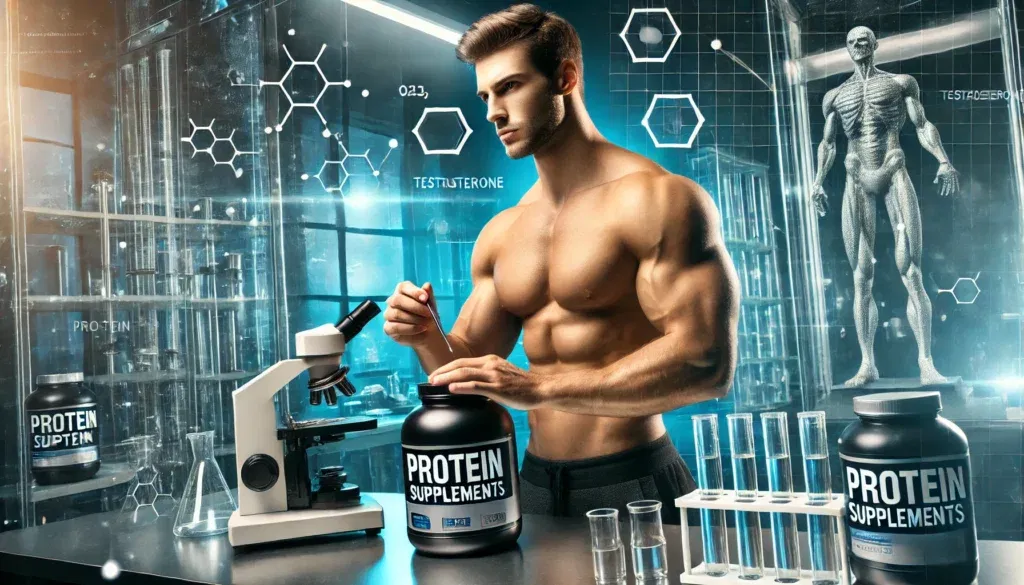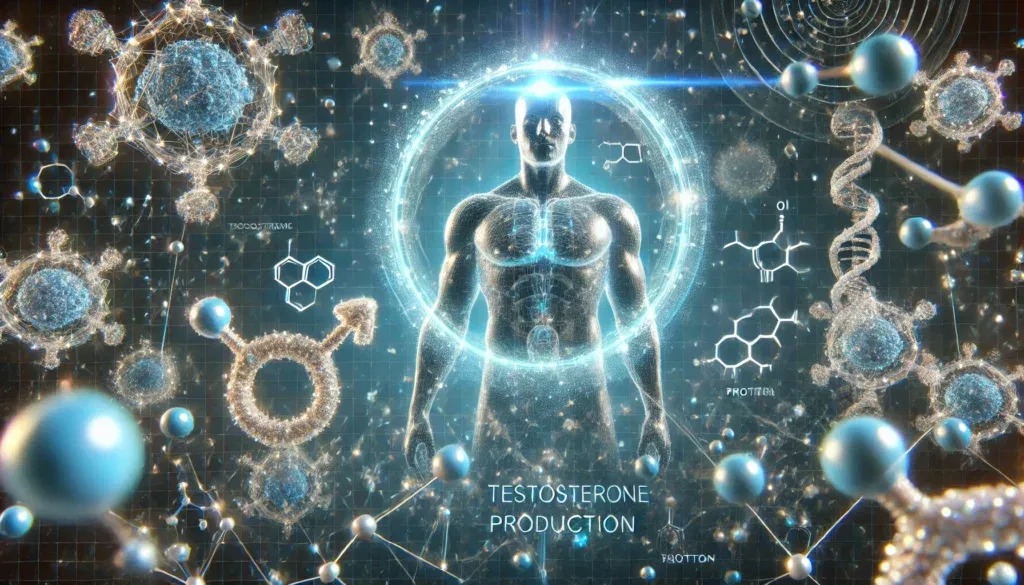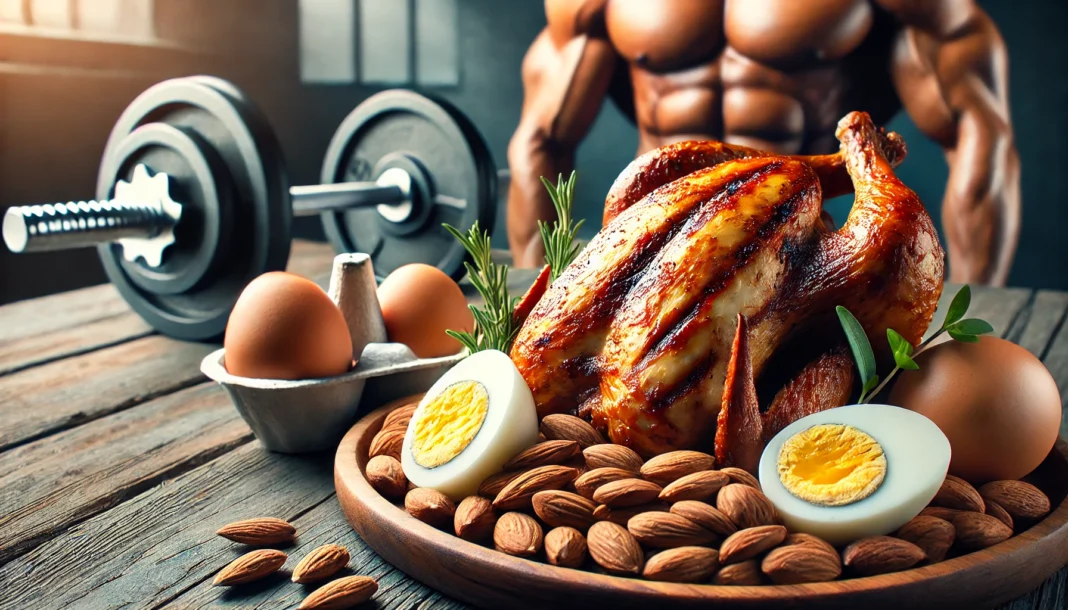Testosterone plays a crucial role in male health, influencing muscle mass, bone density, mood, and overall vitality. For those looking to optimize hormone levels, diet is often a primary focus, with protein intake frequently discussed in relation to testosterone production. Many individuals wonder: does protein increase testosterone? This article delves into the intricate relationship between dietary protein and testosterone levels, examining the latest scientific research, biological mechanisms, and practical applications for those seeking hormonal balance.
You may also like: How to Increase Testosterone Levels Naturally: Science-Backed Strategies for Men’s Health & Longevity
Understanding Testosterone and Its Importance in Male Health
Testosterone is the primary androgenic hormone responsible for various physiological functions. It is crucial for muscle growth, fat metabolism, bone density, libido, and cognitive health. Produced predominantly in the testes in men and in smaller amounts in the adrenal glands and ovaries in women, testosterone synthesis is regulated by the hypothalamic-pituitary-gonadal (HPG) axis. Any imbalance in this system can result in decreased testosterone levels, leading to fatigue, reduced muscle mass, and even mood disorders.
A multitude of factors influence testosterone levels, including age, genetics, lifestyle, exercise, and nutrition. Among these, protein intake has been widely studied for its potential role in supporting optimal testosterone levels. The body requires essential amino acids, the building blocks of protein, to sustain various metabolic processes, including the production of hormones like testosterone. However, the relationship between dietary protein and testosterone is more complex than a simple direct correlation.

How Protein Affects Testosterone Production
Protein is a fundamental macronutrient that supports muscle growth and tissue repair. It also plays a role in hormone synthesis, including the production of testosterone. Several mechanisms explain how protein intake may influence testosterone levels:
- Amino Acids and Testosterone Synthesis: Testosterone is synthesized from cholesterol, a lipid molecule, but the enzymes that regulate this process rely on sufficient protein intake. Specific amino acids such as leucine, arginine, and glutamine contribute to anabolic processes that can indirectly support testosterone production.
- Impact on Cortisol Levels: Cortisol, the body’s primary stress hormone, has an inverse relationship with testosterone. High protein diets, particularly those rich in lean meats and plant-based sources, may help regulate cortisol levels. When cortisol is elevated due to chronic stress or inadequate nutrition, testosterone production can suffer. Thus, maintaining adequate protein intake may help mitigate cortisol spikes that suppress testosterone levels.
- Influence on Muscle Mass and Physical Activity: Higher protein intake is essential for muscle synthesis and repair. Resistance training is one of the most effective ways to boost testosterone, and protein consumption plays a crucial role in post-exercise recovery. Consuming adequate protein ensures that the body has the necessary building blocks to sustain muscle hypertrophy and hormonal balance.
The Optimal Protein Intake for Testosterone Support
The amount of protein needed for optimal testosterone levels varies depending on age, activity level, and overall health status. General recommendations suggest that moderately active individuals should consume 0.6 to 1.0 grams of protein per pound of body weight. However, those engaged in intense resistance training or endurance sports may require higher amounts.
Studies indicate that consuming excessive protein at the expense of other macronutrients, particularly healthy fats, may reduce testosterone levels. Since testosterone is synthesized from cholesterol, a diet excessively skewed toward protein while lacking in dietary fats could negatively impact hormone production. Balancing protein intake with healthy fats and carbohydrates is essential for maintaining optimal testosterone levels.
Animal vs. Plant-Based Proteins: Which is Better for Testosterone?
Both animal and plant-based protein sources provide essential amino acids necessary for overall health and muscle maintenance. However, their effects on testosterone may differ:
- Animal Proteins: Sources such as beef, eggs, poultry, and fish contain high biological value protein and essential nutrients like zinc, vitamin D, and omega-3 fatty acids, all of which contribute to testosterone synthesis. Red meat, in particular, is rich in saturated fats, which can support testosterone production when consumed in moderation.
- Plant-Based Proteins: Legumes, nuts, seeds, and whole grains provide adequate protein but often lack certain essential amino acids found in animal sources. Some plant-based foods, such as soy products, contain phytoestrogens that may influence testosterone levels. While moderate soy intake does not appear to significantly lower testosterone, excessive consumption should be approached cautiously.
A well-balanced diet incorporating both animal and plant-based protein sources is ideal for sustaining testosterone levels while supporting overall health.
The Role of Protein Timing and Distribution in Testosterone Regulation
Beyond total protein intake, meal timing and distribution play an important role in hormone regulation. Spacing protein consumption evenly throughout the day ensures a continuous supply of amino acids for muscle repair and metabolic function. Additionally, consuming protein-rich meals after exercise can enhance muscle recovery and promote favorable testosterone levels.
Intermittent fasting and meal timing strategies have also been studied for their impact on testosterone. Some research suggests that fasting periods followed by protein-rich meals may enhance testosterone response due to increased luteinizing hormone (LH) secretion, a key regulator of testosterone production. However, prolonged fasting and severe caloric restriction can suppress testosterone levels due to increased cortisol production and energy deficits.
The Connection Between Protein and Other Nutrients for Testosterone Optimization
Protein alone is not the sole determinant of testosterone levels. Several micronutrients work in tandem with protein to support hormone production:
- Zinc: Found in high-protein foods such as red meat, shellfish, and seeds, zinc is essential for testosterone synthesis. Deficiencies can lead to suppressed testosterone levels and impaired reproductive function.
- Vitamin D: Fatty fish, egg yolks, and fortified dairy products contain vitamin D, which plays a direct role in regulating testosterone.
- Magnesium: Found in leafy greens, nuts, and whole grains, magnesium aids in muscle function and testosterone regulation by reducing oxidative stress.
- Healthy Fats: Testosterone is derived from cholesterol, making dietary fats crucial. Avocados, olive oil, nuts, and fatty fish provide essential lipids needed for hormone synthesis.
Ensuring a balanced intake of these nutrients alongside protein can enhance testosterone production and overall metabolic health.
Potential Risks of Excessive Protein Intake on Testosterone Levels
While protein is necessary for maintaining muscle and hormonal function, excessive intake can have unintended consequences. Very high protein diets that significantly reduce fat and carbohydrate intake can lead to hormonal imbalances. Research suggests that an overreliance on protein at the expense of dietary fat may lower free testosterone levels by reducing cholesterol availability for hormone synthesis. Additionally, an imbalance in macronutrients can increase cortisol production, which suppresses testosterone.
Kidney function is another concern with excessive protein intake, particularly in individuals with pre-existing renal conditions. Though healthy individuals generally do not experience kidney issues from high-protein diets, consuming excessively large amounts over prolonged periods may place undue stress on renal function.

Frequently Asked Questions (FAQ) About Protein and Testosterone
1. Does protein increase testosterone naturally?
Yes, protein plays a crucial role in hormone regulation, including testosterone production. A diet with adequate protein helps maintain muscle mass, supports metabolic functions, and reduces stress-related hormone imbalances that can lower testosterone. However, excessive protein intake without balancing fats and carbohydrates may suppress testosterone levels by increasing cortisol, a stress hormone that can inhibit testosterone production. To maximize benefits, protein should come from diverse sources like lean meats, fish, eggs, and plant-based proteins. Moderation and a well-rounded diet are key to ensuring protein positively impacts testosterone.
2. What is the connection between protein and testosterone production?
Protein provides essential amino acids that support muscle growth and repair, indirectly influencing testosterone levels. The body needs specific nutrients, including proteins, to synthesize hormones efficiently. Research suggests that an optimal balance of macronutrients—protein, healthy fats, and carbohydrates—promotes testosterone synthesis. Protein alone is not a magic bullet; consuming it alongside zinc, vitamin D, and omega-3 fatty acids enhances its benefits. Additionally, protein-rich diets should be complemented by resistance training, which naturally boosts testosterone.
3. Can eating too much protein lower testosterone levels?
While protein is essential for overall health, excessive intake can have unintended consequences. Extremely high protein consumption, particularly at the expense of healthy fats and carbohydrates, may lead to elevated cortisol levels, which suppress testosterone production. Furthermore, excess protein can result in nitrogen buildup, straining the kidneys and potentially affecting hormone balance. To avoid this, athletes and active individuals should follow recommended protein guidelines based on body weight and activity level. A balanced approach to nutrition ensures that protein supports rather than hinders testosterone levels.
4. What are the best sources of protein for boosting testosterone?
Not all protein sources impact testosterone equally. Animal-based proteins such as beef, chicken, eggs, and fish contain high levels of zinc and vitamin D, both of which are essential for testosterone production. Plant-based proteins like lentils, quinoa, and tofu can also support hormone health, but they may require additional nutrient supplementation. Choosing minimally processed, high-quality protein sources ensures that the body gets the necessary building blocks for testosterone synthesis. Combining protein with healthy fats from avocados, nuts, and olive oil further optimizes hormonal balance.
5. How does protein intake affect testosterone levels in athletes?
Athletes require higher protein intake to support muscle repair and recovery, but the balance of macronutrients is crucial. Studies indicate that endurance athletes who consume very high protein with low carbohydrate intake may experience reduced testosterone levels. Strength training athletes, on the other hand, benefit from adequate protein when paired with resistance exercises, which naturally stimulate testosterone production. Hydration, sleep, and overall diet quality also play critical roles in ensuring protein positively influences hormone levels. Thus, strategic meal planning helps athletes maintain optimal testosterone levels while meeting performance needs.
6. Can a low-protein diet reduce testosterone levels?
Yes, insufficient protein intake can lead to muscle loss, fatigue, and hormone imbalances, all of which can contribute to lower testosterone levels. Protein is essential for maintaining lean muscle mass, which in turn supports healthy testosterone production. Additionally, low protein intake may impair the body’s ability to produce key enzymes and hormones, leading to metabolic slowdown. While other macronutrients are also necessary, ensuring an adequate protein intake helps sustain energy levels and hormonal health. Those following vegetarian or vegan diets should carefully select protein-rich plant foods to maintain testosterone levels.
7. Does the type of protein consumed impact testosterone differently?
Yes, the source of protein can influence its effects on testosterone. Animal proteins provide complete amino acid profiles and are rich in micronutrients like zinc, vitamin B12, and omega-3 fatty acids, which are crucial for hormone production. Plant-based proteins, while beneficial, often require combination with other foods to ensure complete amino acid intake. Some processed protein sources, such as soy, contain phytoestrogens that may slightly alter hormone balance when consumed in excess. Choosing a variety of protein sources ensures that testosterone levels remain optimal while meeting nutritional needs.
8. How do protein supplements affect testosterone?
Protein supplements, such as whey or plant-based protein powders, can be a convenient way to meet daily protein needs. Whey protein, in particular, contains leucine, an amino acid that supports muscle growth and testosterone production. However, some low-quality protein supplements contain additives, artificial sweeteners, or excessive soy content, which may negatively impact hormone levels. When choosing a protein supplement, it’s important to opt for high-quality, minimally processed options. Whole food sources of protein should always be prioritized, with supplements serving as a complementary option.
9. Can protein help with testosterone-related fatigue?
Fatigue and low energy levels are common symptoms of low testosterone. Since protein supports muscle repair and overall metabolic function, it can help mitigate fatigue. A protein-rich diet aids in stabilizing blood sugar levels, preventing energy crashes that may contribute to hormonal imbalances. Pairing protein with complex carbohydrates and healthy fats ensures sustained energy release throughout the day. Additionally, maintaining an active lifestyle and getting sufficient sleep further enhances the energy-boosting effects of protein on testosterone health.
10. How does age affect the relationship between protein and testosterone?
As men age, testosterone levels naturally decline, making dietary choices increasingly important. Consuming adequate protein helps preserve muscle mass and prevent sarcopenia (age-related muscle loss), which is closely linked to testosterone levels. Older adults should focus on high-quality protein sources and resistance training to maintain hormonal health. Additionally, maintaining optimal intake of key nutrients like magnesium, vitamin D, and omega-3 fatty acids enhances the benefits of protein for testosterone support. A well-rounded diet and lifestyle adjustments can mitigate the age-related decline in testosterone production.

Conclusion: Balancing Protein Intake for Optimal Testosterone Levels
The question of “does protein increase testosterone?” is best answered with nuance. Protein plays a crucial role in maintaining muscle mass, regulating stress hormones, and supporting overall metabolic health—all of which contribute to healthy testosterone levels. However, balance is key. Consuming adequate protein in conjunction with healthy fats, carbohydrates, and micronutrients is essential for optimizing testosterone production.
For those looking to enhance testosterone levels, incorporating high-quality protein sources, maintaining a balanced diet, and engaging in regular resistance training can provide significant benefits. While protein is an essential component of hormone health, it should not be consumed in isolation from other critical dietary factors. By prioritizing a holistic approach to nutrition, individuals can support long-term hormonal health and overall well-being.
testosterone boosting foods, best protein for testosterone, hormone health diet, lean protein sources, muscle building and testosterone, high protein diet benefits, amino acids for testosterone, protein-rich meal plans, nutrition for male hormones, testosterone support supplements, natural ways to boost testosterone, diet and hormone balance, optimizing testosterone naturally, plant-based proteins for testosterone, whey protein and testosterone, intermittent fasting and testosterone, strength training and hormone health, low testosterone symptoms, high-protein diet risks, best diet for men’s health
Further Reading:
High-protein diets and testosterone
High-protein diets and testosterone
Disclaimer: The information provided in this article is for general informational purposes only. The content does not constitute professional advice of any kind, including but not limited to medical, legal, or financial advice. HisHealthMag and its contributors make no representations or warranties regarding the accuracy, completeness, or reliability of the information presented. Always seek the advice of a qualified professional for any specific concerns or questions you may have. Neither HisHealthMag nor its authors assume any responsibility or liability for any actions taken based on the information provided in this article. The views and opinions expressed are those of the author(s) and do not necessarily reflect the official policy or position of HisHealthMag.





